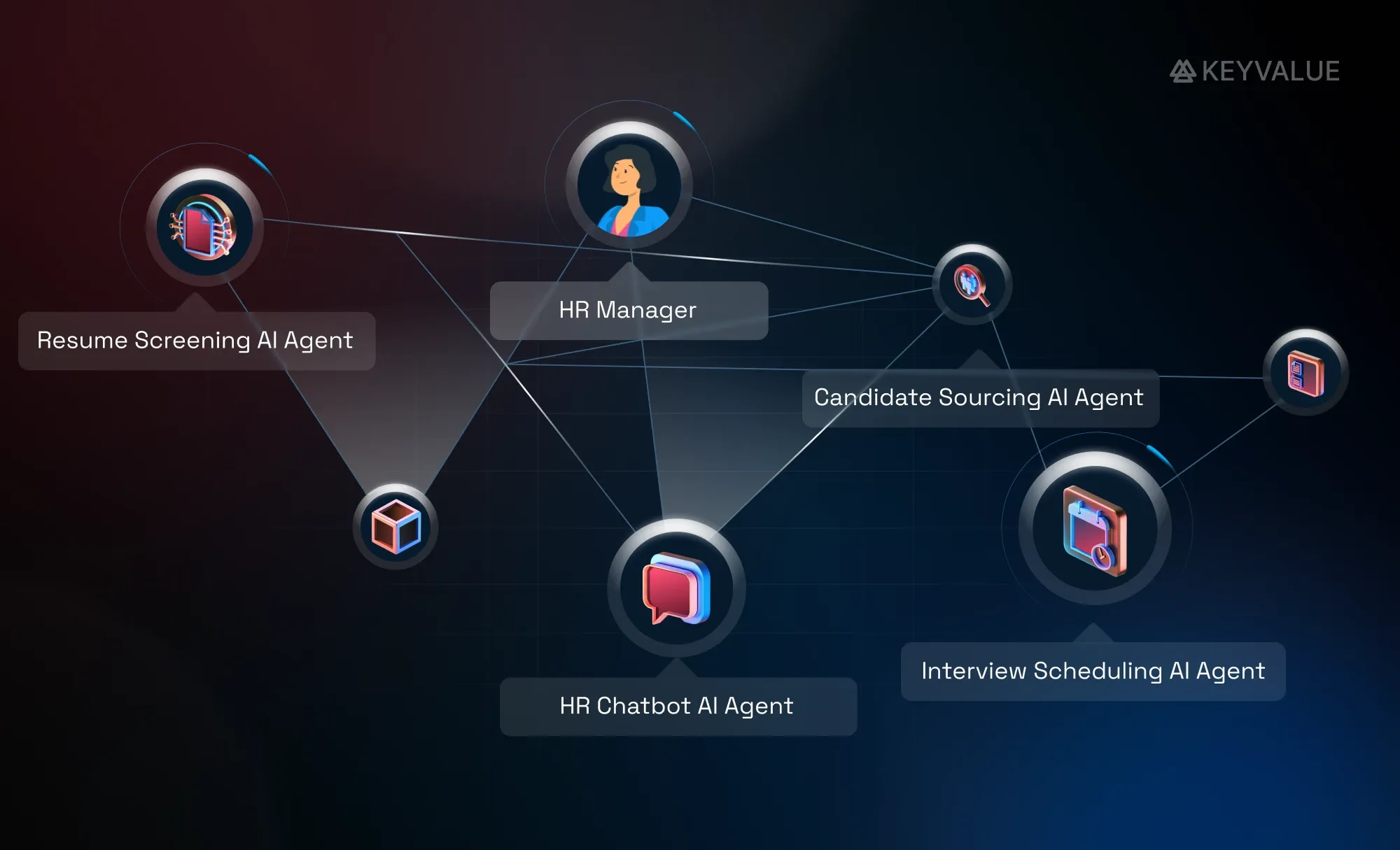
Highlights
- Agentic AI works toward its own goals, learns after every action, and can finish an entire workflow with only light human oversight, moving business tools from reactive help to full autonomy.
- The benefits stand out—higher productivity, lower costs, better decisions, scalability, faster execution, richer customer experiences, adaptability, and fewer human errors—showing why AI agents and agentic AI matter for data-heavy work.
- KeyValue already proves the shift with Sked and PENCIL and is building 20+ new agents, helping early adopters stack advantages as they move from classic SaaS to AI-run operations.
AI agents and Agentic AI are at the forefront of transforming industries and business workflows. While generative AI tools like GPT and DALL-E have made waves by creating content, they are reactive and dependent on user input.
Agentic AI, however, takes a major leap forward, enabling systems to operate autonomously, adapt to dynamic environments, and execute complex workflows with minimal human involvement. This shift marks a pivotal moment in how businesses will function in the future.
This blog explains Agentic AI and AI Agents, how they improve business workflows, and their benefits for businesses. It also shows how KeyValue's products use this technology to create smarter solutions.
What is generative AI?
Generative AI is a powerful assistant, excelling at creating text, images, or videos based on input. For instance, tools like ChatGPT generate detailed responses, while DALL-E creates stunning images from textual descriptions. However, generative AI operates in a reactive manner, responding to prompts based on pre-trained data, but it doesn’t learn or adapt independently from each new interaction.
What are AI agents?
AI agents are typically built to perform specific tasks. They’re designed to help with activities like answering questions, organizing calendars, or managing email inboxes. These virtual helpers excel at automating simple, repetitive tasks but lack the autonomy and decision-making abilities of agentic AI. Think of them as assistants that do exactly what they’re told, without independently thinking for themselves. For instance, an AI agent can sort emails based on rules but wouldn’t learn or adapt to new patterns on its own.
Benefits of AI agents
AI Agents are designed to handle specific tasks with precision, enabling businesses to optimize their operations and focus on strategic goals. Key benefits include:
- Enhanced productivity: By automating repetitive tasks like data analysis or scheduling, AI agents free up human resources for innovation.
- Cost efficiency: Businesses can replace multiple tools with a unified AI system that handles diverse workflows.
- Adaptability: With continuous learning, AI agents become smarter and more aligned with business needs over time.
- Better decision-making: Analyzing data like a human, AI agents provide accurate insights for strategic decisions.
- Scalability: AI agents can easily scale with business growth, handling increased workloads or complex tasks without the need for significant additional resources.
- Improved customer experience: AI agents can handle customer interactions, provide real-time support, and offer personalized recommendations, enhancing customer satisfaction.
- Faster execution: AI agents can process tasks at a speed and efficiency beyond human capabilities, accelerating timelines and improving overall workflow speed.
- Reduced human error: AI agents can perform tasks with a high degree of accuracy, reducing the chances of human error, particularly in repetitive or data-heavy tasks.
“AI agents will become the primary way we interact with computers in the future. They will be able to understand our needs and preferences, and proactively help us with tasks and decision making.”– Satya Nadella, CEO of Microsoft
Sked: An AI agent to simplify scheduling meetings
Sked simplifies scheduling within Slack, enabling you to manage meetings, find time slots, and integrate with Google Meet effortlessly. Designed for busy professionals and teams, it keeps workflows organized and efficient.
Agentic AI in Sked
Sked’s capabilities extend beyond basic scheduling. It incorporates Agentic AI, allowing it to act autonomously and optimize workflows by making proactive decisions.
Key features of agentic AI in Sked:
- Proactive suggestions
- Sked recommends time slots or meeting formats based on user preferences and historical data.
- Adaptive learning
- Over time, Sked learns user habits, such as:
- Preferred meeting durations.
- Frequently invited attendees or groups.
- Common recurring schedules.
3. Conflict resolution
- Sked autonomously resolves scheduling conflicts by:
- Suggesting alternative time slots.
- Alerting users about overlapping meetings before finalizing schedules.
4. Multi-agent collaboration
- Sked’s AI agents interact seamlessly with external systems like Slack and Google Calendar, ensuring real-time updates and synchronization across platforms.
Why Sked?
- Efficiency: Automates repetitive scheduling tasks, saving valuable time.
- Accuracy: Minimizes errors in managing and updating schedules.
- Scalability: Handles multiple user requests effortlessly, even in high-demand scenarios.
- User-centric personalization: Adapts to individual needs for a tailored scheduling experience.
Sked is a prime example of how AI agents and agentic systems are transforming traditional workflows into proactive, intelligent solutions, redefining how we approach productivity tools.
What is agentic AI?
Agentic AI functions like a strategic partner. It’s autonomous, adaptive, and capable of learning over time. Consider a driverless car. Unlike generative AI, it doesn't just react to commands but interprets its surroundings, processes data, and makes decisions dynamically. Agentic AI sets clear goals, refines its actions, and continuously adapts based on new information.—qualities that enable it to handle complex workflows with minimal human oversight.
Benefits of agentic AI
Agentic AI takes automation to the next level by operating autonomously and adapting to complex, dynamic environments. Its benefits include:
- Autonomous decision-making: Agentic AI can set goals, make strategic decisions, and take actions without constant human oversight, enabling businesses to operate more efficiently.
- Advanced adaptability: Agentic AI continuously learns from interactions and refines its processes to align with changing business needs, ensuring long-term relevance.
- Faster execution of complex tasks: Agentic AI handles intricate workflows at unparalleled speeds, accelerating business operations and reducing time-to-market.
- Deeper insights for strategic growth: By analyzing vast amounts of data contextually, Agentic AI provides actionable insights that drive innovation and competitive advantage.
- Proactive problem-solving: Agentic AI anticipates challenges and adapts to new scenarios, ensuring smoother operations and minimizing disruptions.
An example of agentic AI in action
PENCIL: Revolutionizing advertising with agentic AI
PENCIL is a standout example of how AI agents are transforming industries. Its Chat to Ads tool goes beyond traditional ad creation, using AI agents to deliver a seamless, conversational experience for businesses.
- Conversational ad creation: Enables users to chat to provide details for ad creation. Missing information? The agent asks clarifying questions or suggests suitable images or text from your asset library.
- Content generation: The AI agent can generate new images or text if specific elements are unavailable, ensuring no creative roadblocks.
- Streamlined publishing: Once the ad is finalized, it can be published directly across multiple channels, saving time and effort.
PENCIL’s Chat to Ads leverages AI agents to make ad creation intuitive and goal-driven, empowering businesses to create impactful campaigns with minimal effort.
Difference between Generative AI vs. AI Agents vs. Agentic AI
| Feature | Generative AI | AI Agents | Agentic AI |
|---|---|---|---|
| Autonomy | Requires constant human input | Performs specific tasks based on rules | Performs specific tasks based on rules |
| Goal-oriented | Reactive to prompts | Task-specific, not goal-driven | Works toward objectives |
| Learning | Limited to pre-trained data | No self-learning capabilities | Adapts and learns from interactions and outcomes |
| Complex decision-making | Selects outputs based on patterns | Follows predefined workflows and rules | Evaluates outcomes dynamically |
| Environmental awareness | No real-world perception | Limited to the task environment | Interprets surroundings |
Want to stay on top of dev trends? Check out our Vibe Coding blog for the latest in engineering and tech culture.
Agentic AI and AI agents: The rise of a new era
Just as SaaS revolutionized the business world in 2004 by simplifying software delivery and cutting costs, AI Agents and Agentic AI are now set to replace traditional SaaS models. While SaaS focuses on providing software tools that still need human input, AI agents excel at automating specific tasks, agentic AI takes automation further—making decisions, optimizing processes, and driving strategic growth with minimal human intervention.
From PENCIL’s Chat to Ads transforming ad creation to Sked optimizing scheduling, AI-powered solutions are already redefining how businesses operate. The future of business lies in AI-driven workflows that are proactive, scalable, and seamlessly integrated.
At KeyValue, we’re leading this transformation by developing AI agents that go beyond automation to enable businesses to thrive in an AI-first world. With over 20 AI agents in development, we’re committed to building intelligent solutions that drive efficiency, innovation, and growth. The future isn’t just about software—it’s about AI-powered execution. Let's build that future together.
Frequently asked questions
1. What is the difference between AI agents and Agentic AI?
AI agents automate predefined tasks based on set rules, while Agentic AI can make autonomous decisions, adapt to changing contexts, and operate toward defined goals without constant human input.
2. How is Agentic AI improving business workflows?
Agentic AI streamlines workflows by making real-time decisions, learning from outcomes, and proactively resolving issues—leading to faster execution, fewer errors, and more efficient operations.
3. What industries are adopting Agentic AI the fastest?
Industries like finance, advertising, and enterprise automation are leading the adoption. They use Agentic AI for fraud detection, ad optimization, and workflow orchestration to enhance productivity and reduce human intervention.
4. How does Agentic AI differ from Generative AI?
Generative AI creates content like text or images based on prompts, while Agentic AI goes further by analyzing environments, setting goals, and executing complex workflows autonomously.
5. How can businesses leverage AI agents and Agentic AI today?
Businesses can integrate AI agents for repetitive tasks, such as customer support or scheduling, while adopting Agentic AI for high-level automation that enhances decision-making, scalability, and performance optimization.

